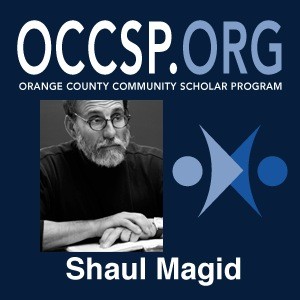CSP: Magid – Jewish Thinking Outside the Christian Gaze – The Case of Hasidism

Shaul Magid, a professor of Jewish studies at Indiana University, received his ordination in Israel, completed his Ph.D. at Brandeis University, and later served as the rabbi of Fire Island Synagogue. Along the way, his religious life ranged from Charedi communities in Brooklyn and Jerusalem to a collective founded by students of the charismatic Chasidic Rabbi Shlomo Carlebach, all of which means that he is uniquely positioned to perceive and understand the subtleties and complexities of Jewish history and destiny. He focuses on “Jews who happen to live in America,” which is something quite different from “American Jewry,” and he wonders “how much ‘America’ is in American Judaism” and “[h]ow much ‘Jewishness’ [has] changed in contemporary America.
Shaul Magid on Shaul Magid:
“I grew up as a secular Jew in the suburbs of New York City. In 1978 at the age of twenty I became a baal teshuva and fairly quickly entered into the haredi world in Brooklyn and Jerusalem initially under the tutelage of an obscure and enigmatic Hasidic rabbi named Dovid Din. Before total submersion into old world Hasidism I had a few brief encounters with two individuals who occupied considerable space in my psyche throughout (largely unbeknownst to them): Shlomo Carlebach and Zalman Schachter-Shalomi (Dovid Din had been a student of Schachter-Shalomi in the mid 1960s). While Carlebach and Schachter-Shalomi offered an inspirational model of Jewish spirituality that spoke to my own counter-cultural inclinations, Dovid Din offered something they did not: a narrow and dark path into the bowels of mystical religiosity. Committed to finding a path that would allow me to escape the suburban fleshpots of my youth and looking for the “authentic” spiritual life, I followed Dovid inward, walked the Hasidic walk and talked the Hasidic talk, studying in Hasidic, Sephardic and later Modern Orthodox yeshivot for almost seven years and then living for three years in Moshav Modi’im, a small collective community in Israel founded by students of Shlomo Carlebach. For reasons not relevant here I eventually left the haredi world realizing I was living more in Dovid Din’s fantasy of a spiritual community than the more messy and in many ways less “spiritual” world of real-life Hasidism. I subsequently abandoned Orthodoxy more generally yet remained fascinated by, and deeply invested in, the complex nexus of Judaism and the American counter-culture in which I was raised. Academia, in particular, area or religious studies, is a logical choice for many in my situation, people who passed through various avenues of alternative lifestyles yet felt unsatisfied “inside” and left them often to gain a deeper intellectual understanding of how those worlds work and why they didn’t work for them. For people like me, academia is a form of self-exile. After writing many scholarly articles and numerous books on Hasidism and Kabbalah, (and, yes, getting tenure) I came to a point succinctly expressed recently by Judith Butler, “I was also living a life outside those [academic] walls [and I] wondered whether I could link the different sides of my life.” And so, in light of, and in spite of, my enduring commitment to the academy I turned my attention to what Edward Said coined as my “own genealogy” as a way to avert the “bad faith” he claimed accompanied the illusion of objectivity. I have tried to stay true to the pursuit of academic excellence and embody Said’s notion of the “invested scholar.” It is a narrow path indeed, a path that is, as the Jewish tradition states, “between fire and ice.” I try to walk softly and keep my eyes on the road.
